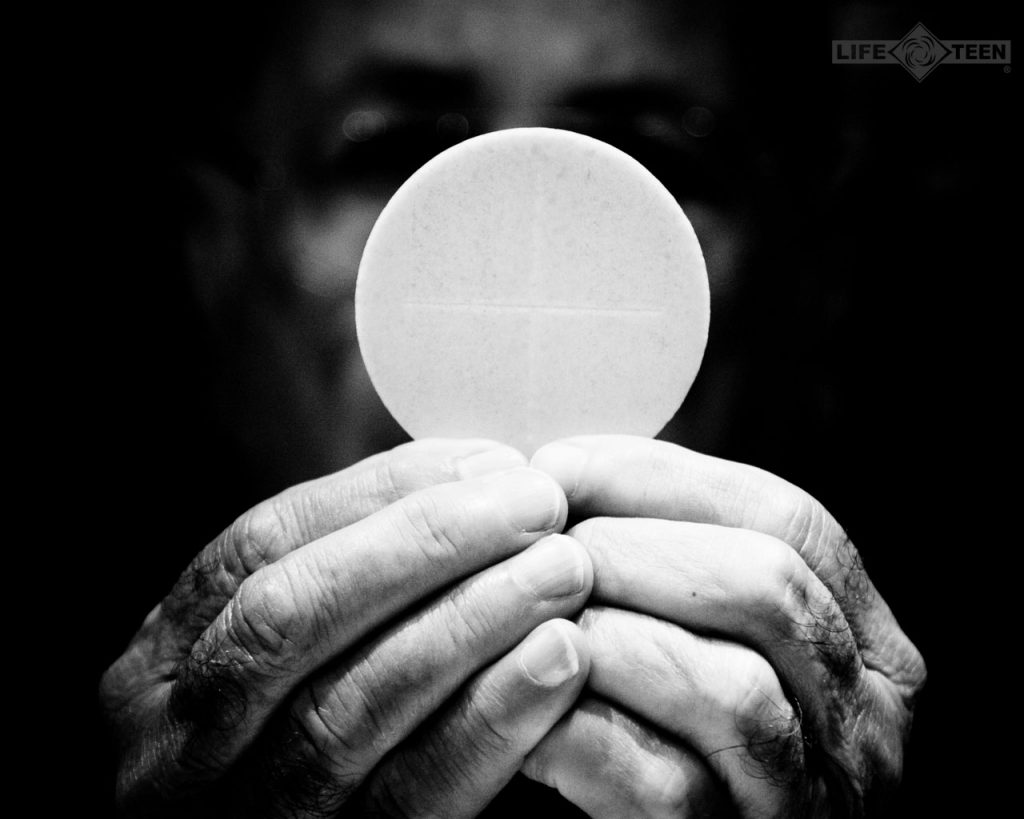
Mass readings for the 5th Sunday of Easter:
Acts 6.1-7 Psalm 33.1-2, 4-5, 18-19 1 Peter 2. 4-9 John 14.1-12
In the gospel we hear Thomas say he doesn’t know where Jesus is going; and we hear Philip ask Jesus to show them God. Both instances left me wondering, as with Jesus, have they been with him for three years to no effect; are they more clueless than on the day he invited them to join his ministry? Are they, perhaps, unconsciously resisting the truth he has shared with them?
Remember how at Caesarea Philippi, Peter confessed that Jesus is the Messiah, but when Jesus explained what that really meant, Peter refused to hear it, and rebuked Jesus in front of the others prompting our Lord’s famous reply, “Get behind me, Satan.”
Do we put this down to intellectual laziness? Just not bothering to think, and as with Philip, wanting it to be easy? Just show us. Don’t make us work for the answers.
When I was with our grade 2s at the local schools, I went through this exercise. I held this up (a puck) and I asked, “Is this hockey?” Hands shot up, half the kids nodding “yes;” the rest seemed confused. I acknowledged one of the hands, and the child said, “yes.” I then asked if they really thought that was so. What is this? It’s a puck – it’s not hockey. You need one to play, but there’s a whole lot more to it. They all agreed, and then we went on to list all things, the people required (players, coaches, etc.), the need for rules and referees and a penalty box, to have “hockey.” And we were all agreed that we now knew what hockey is – it’s not just a puck.
Then I held this up (a large “priest’s” host – don’t worry it’s not consecrated), and I asked, “Is this communion?”
Hands shot up, half the kids nodding “yes;” I acknowledged one of the hands, the child said, “yes, that’s communion.” In that moment, I had some insight into Jesus’s experience of teaching the gospel. So, we went through the same exercise again – this time not about hockey and pucks, but about how this isn’t communion, but we can’t have communion without the body and blood of our Lord; there’s a lot more to it. Now, you might say, “come on, Father, they’re only seven years old.” Fair enough.

You know I’ve run into this with adults who have this same misunderstanding, but there is a lot less openness to learning or acknowledging that one might be mistaken. One must wonder how adult mistakes gets passed on.
We’re having (we have had) some baptisms this weekend, and that put me in mind of an episode from my early days as a pastor.
There was a child to be baptized. The mother came to church quite regularly. I asked her and her husband and the godparents to come round for a cup of coffee or tea – we’d briefly review the service. My bishop had directed that godparents understand their promises and appreciate what they were undertaking as sponsors of children.
Well, the time came, and when I met them at the door, I could tell that the father did not want to be there. No sooner do we sit down than this dad says, “Padre, I want to know why the hell you’re wasting my time.”
I was taken aback. My wife was in earshot, and my two-year-old just across the room; that was aggressive, and rude, but I controlled myself. I explained it was my duty to review with them the baptism rite and our understanding of the faith, particularly as expressed in the baptismal promises.
“The faith?” he says, “I was an altar boy for ten years, I think I know what the faith is.”
So, I asked him, “what is the faith?”
“It’s knowing right from wrong, there’s other stuff, but that’s what it’s about, right from wrong.”
I looked at him, and calmly said, “no, it’s not. There is a moral code, there is knowing right from wrong, but that’s not Christianity. The Christian faith is about a living relationship with God through Jesus Christ in regular prayer, worship, and service; it’s about living out one’s life in a Christ-like manner: selflessly, unselfishly, sacrificially and in holiness, working for the good of others, your family and neighbours, but really everyone; those you meet in this life, and those you may never meet yet by your life you make this world a better place for all. So, it’s more than knowing right and wrong.”
He was quiet for a second or two, then said something like, “Okay, I said there was more to it, but it’s still knowing right and wrong.”
After that, we got through one of the longer half hour meetings of my life.
Years later, a former parishioner wrote to me informing me of that father’s death. She enclosed a clipping from the local paper. It was an article about a real estate swindle, a mysterious woman, and the finding of that man’s body in a burned-out pickup truck by the shore of an isolated fishing lake.
It’s more than about knowing right and wrong, it’s about having the strength, and by grace the supernatural strength to do what is right. This faith is more than knowing, more than rituals, it is about relationships with God, with fellow believers, and being guided by the story of Jesus Christ as much as his moral teaching. We gather for strength, we meet for support, we pray for inspiration, we receive sacraments to both nurture our souls but also knit us into this community of faith and put us in touch with the source of all that is good and just and true.
This life of discipleship is not easy because life itself involves unavoidable suffering that too many choose to deal with by distraction, denial, and a deadening of the soul. In discipleship we have a way of living through that suffering into something meaningful and liberating.
We celebrate Mary in May, the crowning of our Lady as Queen of the Universe as an acknowledgment of someone who lived out a human life filled with suffering, and doubt, and fear, but ultimately with a faith that has seen her exalted as the greatest example we have of a mere human being who put complete trust in God.
Look at what is becoming of our civilization, how it is progressing into barbarity, into violence, into ignorance, into division. Now contemplate what our leaders, in politics, in culture, in business, have done to address this. They’ve worked to make us soft, they create a culture where any suffering is considered a horror, any demand upon us either as individuals or as a community to be more than self-absorbed consumers is an outrage, any challenge to the validity of our lifestyle choices as intolerant and hateful. We empower ignorant children to make life altering decisions because they are suffering through the pains of growing up; we provide recreational drugs to adults to alleviate the anxieties that come of life; for the aged and the sick, they are told there is no greater evil than to suffer; and besides, they’re being a burden – so, they are offered death by state assisted suicide. Worst of all we are being made to forget that we are spiritual beings at heart – not mere flesh and blood, not our skin colour, not our sexuality; shame on those who teach such things to our children.
We must remember the power of the gospel when it is lived by us as individuals and as communities. It is more than a wafer of bread, it more than knowing right from wrong, more than a distraction from suffering; it is work.
Jesus said, on the eve of his crucifixion, “I am the way…” and so, how can we think that the way is any other than by the way of the cross? But come the other side of it, through the suffering, is life in abundance, eternal life. When we grow, we suffer the pains of a changing body, when we exercise to grow strong, the aching muscles cause us to suffer, when we learn, the strain on our brains is a suffering that we all know – ask me about learning ancient Greek! That was suffering, and I’m glad for it.
Through a belief in Christ we overcome our fear of suffering and gain the power to do great things. What do we think was the power that gave us the greatest civilization that has ever existed: for all its imperfections, it faults, it has nonetheless freed more people politically, economically, but most importantly, spiritually than any other; and not through the dangerous games we’re playing right now that are compromising the future of our little ones. Our communion in Christ is no game, but the serious business of life lived so that we might do God’s works; his works of justice, of mercy, of love; and these cannot be done in any other way than his, nor apart from him, not without this sacrament of our communion in him that binds us together, with Mary and all the saints in heaven.
Amen.